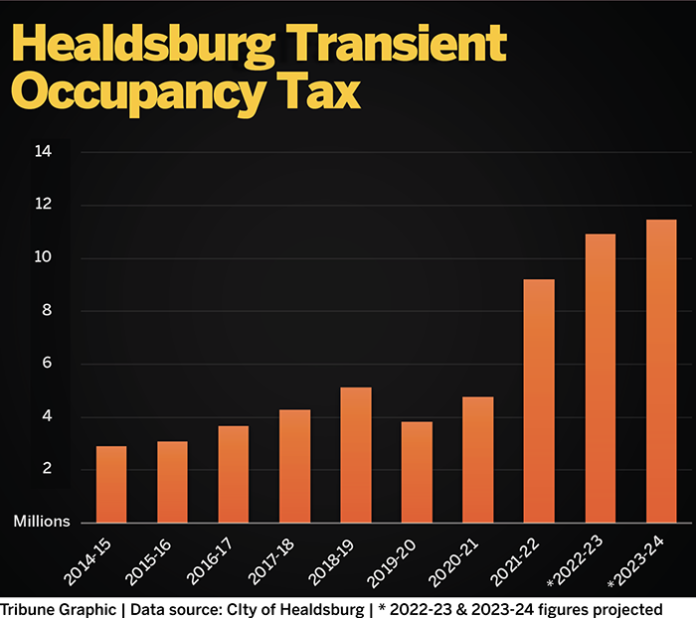The upcoming November general election gives residents a chance to vote not only for three City Council seats—applications will be accepted at least until 5pm on Friday, Aug. 12—but on two measures approved by council on June 21.
The first is a measure to implement an X% tax on cannabis businesses, when and if they ever become allowed in the city. As that implements a tax that goes to the general fund, it only requires a majority to pass into law—placing it on the books even before Healdsburg hammers out a commercial cannabis policy.
The second is a bit more complicated: a revision of Healdsburg’s Transient Occupancy Tax (TOT) applied to overnight visitors, which currently stands at 14%. This charge is added to hotel lodging costs (and motels, B&Bs, resorts and suites, occupied for less than 30 days) and is entirely paid by visitors to town, not by city residents or others doing business in Healdsburg.
Healdsburg first implemented a TOT back in 1965, at a rate of 4%. That has been amended incrementally by the city council no fewer than seven times, usually by another 2% each time until the current rate of 14% was achieved, by a ballot measure in 2016.
Those various increases have provided the city with an allocation of the TOT “revenue streams” at 10% for community services, 2% for affordable housing (the 2016 measure) and 2% directed to the general fund.
The TOT has become a go-to method for jurisdictions that attract tourists to raise funds, in part to offset the impact of tourism itself. Naturally, the income it raises depends on seasonal tourist visitation, and was dramatically impacted by the two years of COVID-related closures as well as wildfire.
This is clear to see by comparing the TOT revenue from 2020-21 (the depth of the pandemic) and 2021-22 (the most recent fiscal year)—when it effectively doubled, from $4,685,361 to at least $8,524,530 (the last two months of FY 2021-22 are not yet available).
Healdsburg’s recent success in attracting visitors, especially upscale food and wine tourists, points the way toward significant increases in TOT income. One facility in particular shows remarkable impact on its own—the Montage resort at Saggio Hills, which started providing tax income to the city in 2021. Overnight stays at Montage are by far the most expensive in town (over $1,200 a night), though additional future hotels in the planning stage will also add TOT revenue to Healdsburg’s budget.
There’s no complaint with the revenue that the TOT produces now, or in the projected future. It creates significant opportunities in community services, especially parks, adds to a growing affordable housing fund and bolsters general fund bottom line to support vehicles and building maintenance, street resurfacing and the pension trust.
But there’s a restriction in the current TOT law: The funds can only be used for providing services and materials, not for paying financial bonds. At least that’s a conservative reading of the TOT ordinances, and that’s why the city is putting a revised TOT measure on the November ballot.
The city manager’s argument to the council in June stated the case: “To clarify the language and to ensure proper use of TOT Ordinance funds, the City has prepared the attached ordinance amending the TOT Ordinance for presentation to the voters. The amendments are targeted specifically at clarifying the City’s authority with regard to use of TOT Ordinance revenue for payment of debt service, principal and interest and any other related cost of issuance of bonds secured by the 10% or 2% TOT Ordinance revenue streams.”
By allowing the TOT funds to be used to underwrite bonds, City Manager Jeff Kay said, the city can move ahead with issuing bonds for two significant parks projects to be built out over successive years: “In terms of new investments, I’m most excited about the Master Plans for the new park at Saggio Hills (near Montage) and the redevelopment of Badger Park with expanded river access.”
Combined, the two parks projects are anticipated to cost $40 million through 2029. This includes the Saggio Hills park, a 36-acre open space that the city received as a condition of the Saggio Hills development (Montage), with 12 acres of developable space accessed off the Parkland Farms community.
Badger Park, off Heron Drive in the so-called “Birdland” neighborhood, is currently the largest park in the city’s inventory. Plans include expanded access to the Russian River, part of the city’s effort to “re-connect” with the river, as well as clearing out the understory of invasive species, adding facilities including an expanded children’s play area and community garden, improved walking trails and a bigger off-leash dog area.
“The price tags are a little daunting, but with the increases we’ve seen in revenues, we have a viable path to getting those projects underway in the relatively near future,” said Kay.








